Reconsidering Florida
Your state is probably just as weird, really—and does it have these four pretty cool things? Plus: I have a lukewarm take on a month-old Literary Twitter controversy!
Hello, and welcome to Issue #2 of this newsletter! I’m pretty impressed with myself for even getting this far, especially in light of how much has been going in this past month. I’ve been getting ready for the relaunch of my novel, doing wedding planning, trying to make progress on my next big writing project, taking a short story class, and getting ready for a multi-day hike through the Marin Headlands that’s coming up later this year. So if this month’s content seems a bit frazzled, well, that’s why.
Just a few weeks until Publication Day!
As I just mentioned, my originally self-published debut novel How I’m Spending My Afterlife will be re-published on September 7th, this time by the fine folks at Woodhall Press. If you didn’t pick up a copy the first time around, I’d truly appreciate it if you’d consider pre-ordering, preferably from your local independent bookstore.
In many ways, the experience of publishing through a smaller independent press is similar to self-publishing—I still have to do a lot of the promotional work myself, for example. But one thing I’ve noticed is that the specific promotional opportunities are significantly better. I’ll be a guest on some podcasts this time, and I’ve got some other cool things in the works as well. I’ll be sure to drop some URLs in this space when things start going live, so you can check them out for yourself if you’re interested.
What I’ve been reading:
Razorblade Tears, by S.A. Cosby. If you don’t know him already, Cosby is probably the hottest crime fiction writer going right now. He writes lean, no-nonsense noir about Black characters in rural Virginia. This one, a followup to last year’s Blacktop Wasteland, is about two grieving fathers—one white, one Black—who team up to seek revenge on the people who murdered their sons (who were married to each other) when the police show a decided lack of interest in solving the case. Cosby combines a tight, directed plot with insightful character studies of Ike and Buddy as they work to accept their sons and each other.
Toyko Ueno Station, by Yu Miri. Though very different from Cosby’s book, this is also a novel about loss. The narrator, Kazu, tells his story from the afterlife, where he is doomed to haunt the park he lived in for the final years of his life. And his story is a bleak one, filled with backbreaking labor and bad luck. Tokyo Ueno Station doesn’t adhere to Western expectations of plot—and why should it? The author is ethnically Korean and lives in Japan—but it does pack an emotional punch, relying on the beauty of Yu’s prose (as rendered through Morgan Giles’ translation) to carry it along.
Thoughts on writing: “Be careful, or I’ll put you in a novel one day.”
Alexis Nowicki published an essay in Slate last month about her experience seeing herself in the narrator of the viral 2017 New Yorker short story “Cat Person.” If you’re not familiar with “Cat Person,” you can read it here. It’s the story of a college-age woman and her short relationship with a significantly older man. Suffice it to say that he doesn’t come off well, especially toward the end.
When the story was first published, Nowicki noticed a number of things about the narrator that made her wonder if the character was directly modeled on her. It seemed possible: She and Roupenian had both attended the University of Michigan at the same time, and the man in the story had a lot of traits in common with “Charles,” who Nowicki had been in a relationship with during her college years. She began to wonder if Roupenian had based the story on them, and if so, how she’d come across all those details—for example, had Roupenian stalked her on social media? Did they know people in common? Had someone told her the story of Nowicki and “Charles?”
Most readers had assumed the details of the story came from Roupenian’s own life, to the point that some people referred to it as “the Cat Person essay.” Roupenian sometimes seemed to encourage this assumption. But eventually, she admitted to Nowicki that, yes, her suspicions were correct, to a degree: Roupenian herself had also had a relationship with “Charles,” but she grafted that experience onto a character whose details matched Nowicki’s when writing the story. (Nowicki says her relationship with “Charles” was, in real life, a much more positive experience.)
Naturally, this caused yet another Literary Twitter meltdown. Many writers responded defensively—some went so far as to say that because the character of Margot wasn’t solely based on Nowicki, she therefore had no legitimate claim on her feelings about being commandeered into the story (sorry, I tried digging up the tweets I had in mind, but now I can’t find them). One glaring problem with this line of argument is that it ignores the fact that when the story was published, Nowicki’s friends recognized her in Margot; some asked if she’d written it under a pen name.
Roupenian certainly had every right to tell her story about that relationship, but once she attached it to the details of another person who’d also had a relationship with the subject of the story, the question got murkier. Whose story was she really telling? And did she have a right to tell it? This is always a tricky subject. I don’t generally believe that certain stories can only be told by certain people. But here, because it was so personal (and so personally identifiable), I think Roupenian should have made more of an effort to disguise the person Margot was based on. The relationship Nowicki had with “Charles” was real, and it was different from the one Roupenian wrote about. To my mind, it wasn’t writing about the actual relationship that was the problem; it wasn’t even necessarily the use of so many of Nowicki’s identifiable details for Margot. It crossed the line because those details came from a person who had also had a relationship with “Charles,” one that differed strikingly from the relationship depicted on the page.
I understand the defensive reaction. I don’t know a single fiction writer who doesn’t draw from their own lives for their work, to one extent or another. I know I do. In fact, it would be impossible for me to write fiction without doing so. My stories come from my attempts to process my experiences—and the experiences of others—and make sense of them, find some sort of meaning in them. One of my better (and as yet unpublished) short stories begins with an incident that happened to a friend of a friend. But I didn’t use any details beyond the most basic facts of the event, and I damn sure gave the character it happened to a different name. It’s not hard, and I’d argue we owe that much to the people who give us our ideas in the first place.
Four things I miss about Florida
Speaking of drawing fiction from real-life experiences (narrator voice: now that’s how you do a segue) … my novel is set in a thinly-disguised version of the Tampa Bay area, where I lived for about 22 years. I came to know it well. Like the rest of Florida, it’s a strange place, by turns beautiful and maddening and surprising and occasionally actively hostile. But after all that time, and for a variety of reasons, Florida had begun to wear on me. When I packed up and lit out for the west coast seven years ago, I thought I’d never miss anything about the place once it was out of my rear view mirror.
Well, I was wrong about that. Turns out, Florida does have a few things that I can't find or replicate easily here in San Francisco:
1. Sandwiches
Yes, there are sandwiches here in San Francisco. I’ve eaten many of them. There are, however, two kinds of sandwiches Florida excelled at but California basically ignores: the Cuban, and the fried grouper sandwich.
It took me a while to warm up to the idea of the Cuban sandwich, mostly because the junior high and high schools I attended all served a weak-ass knockoff of a Cuban sandwich in their cafeterias: an unpressed, not-even-warmed hoagie roll bisected by a micrometer-thin layer of ham, mayo, mustard and pickle. There might have been a sliver of salami in there too, but I wouldn't swear to it. These things were dry and chewy and hopelessly bland, and having moved from Michigan in the 7th grade, I assumed this is what Cubanos were supposed to taste like. So I ignored them.
Of course, once I had a proper Cuban sandwich, there was no going back. Crap on Tampa all you want (and I do, often), but they do know how to do up a Cubano there. And they are everywhere, on both sides of the bay. It was almost impossible to go wrong when ordering a Cuban sandwich, and when that did happen, it was usually because the restaurant was owned by a transplanted New Yorker (or some shlub from Orlando, where they don't know any better) who'd never actually had one.
However, after an extensive search, I can say I have—finally—found a handful of restaurants whose Cuban sandwich game is strong. One is Cha Cha Cha, in the Upper Haight; another is Caña in Oakland, east of Lake Merritt, though theirs is slightly less authentic. There is also another place in the Mission that I have to check out again—I tried that Cubano right before going to see Flipper at the Elbo Room, where I had a decent amount to drink, but that's another story.
What I can’t find at all, though, is a fried grouper sandwich. It’s apparently just not a thing out here. In a place with so many other incredible seafood options, you might think I could just move on to something else. If so, I can only conclude that you have never had a proper fried grouper sandwich.
I will say, however, that living in San Francisco taught me why people care about burritos. Never understood the appeal before I moved out here, but I get it now. Like they say, life is full of little trade-offs.
2. Beaches where I can swim
I've never really been a beach person. Sand annoys me, for one thing, and my Scotch-Polish heritage means I'm not big on sunbathing either. As far as I'm concerned, there are only two valid reasons to go to the beach at all: to play volleyball, or to swim. (Unless you have kids, in which case "letting the little buggers run wild outdoors for a couple of hours while you sit under an umbrella and try desperately to claw back some quiet time for yourself" also counts.) But sometimes, when the weather was good and my mood was just so and I had a day off that most other people didn't have, I would sometimes take advantage of my proximity to the coastline and actually visit Fort DeSoto or St. Pete Beach, or even head all the way down to Siesta Key for an afternoon of flopping about in warm salt water until my eyes burned.
But as the great American poet Tom Kiefer once observed so prophetically, you often don't know what you got 'til it's gone. Beach swimming is all but impossible in California, which you'd never know based on the fact that the Beach Boys never mentioned having to put on rubber wetsuits—the Pacific Ocean is cold—before hopping on a surfboard, but nevertheless, it is so. I cannot go swimming at the beach here, and as a result, swimming at the beach sounds like the most enticing thing ever.
A few years back, I visited a lovely beach in Italy and went for a short swim. It was ... fine. And I know perfectly well that if I were to move back to St. Petersburg tomorrow, I'd probably stop caring about the damn beach before I even got clear of baggage claim. It's just how I am. Still, I miss it now, and that's the point.
3. Thunderstorms
Florida summers are brutal. The one-two punch of high heat and oppressive humidity makes going outside for more than a few minutes at a time exceedingly uncomfortable, unless you like the sensation of having been basted in a thin slick coating of your own perspiration at all times. (Speaking for myself, I’m not a fan.) The sun is relentless, bright enough some days to give you a headache from just looking out the window. You will often find your steering wheel is too hot to touch without gloves.
But on the other hand, there are thunderstorms.
If you've never experienced a Florida thunderstorm, I can tell you they're not like thunderstorms elsewhere. Florida storms are violent. They roll up quickly, turning the sky from bright blue to deep charcoal grey in minutes. Then, after some far-off rumbling, the rain starts suddenly, raking across the landscape in waves and sheets, sometimes coming down hard enough to feel like little stones bouncing off your skin. The accompanying thunder can be loud enough to rattle your windows.
That lasts for about twenty or thirty minutes. Then, as suddenly as it began, it stops. The clouds clear, and for a little while it feels fresh and nearly tolerable outside, until the sun starts to heat up the streets and sidewalks and parking lots again and all that rain starts to evaporate.
When I was at home during a thunderstorm, I always liked to turn everything off and go sit in the Florida room, which was once an open front porch that a previous owner had windowed in. I would listen to the rain beat out a tattoo on the roof and watch the runoff sweep through the gutters in the street, carrying clumps of pine needles and palmetto leaves and cigarette butts along in its current.
We almost never get thunderstorms in San Francisco, maybe once a year or so. And when we do, they're never like that. Outside the city, they carry with them the very real danger of igniting another wildfire, especially in the dry and windy summertime.
4. Publix
Is it weird that I’ve added a grocery store chain to this list? If you’re from Florida yourself, you will know that it is not weird at all. When my family first moved to Florida, my mom shopped at the Winn-Dixie, because there was one directly across the street from our dumpy apartment complex, and because it was a lot cheaper than Publix, which is an important consideration when you have two kids about to start their teen years. Like every Winn-Dixie I’ve been in since, the floors were the kind of dirty that just never comes clean, no matter how many times you mop them. Just being inside that store made me feel grubby. Publix is the anti-Winn-Dixie in basically all respects: unfailingly clean, well-lit stores; lush produce right at its peak; their legendary deli offerings of pub subs and fresh fried chicken. In fact, Publix might be the best thing about the whole dang state.
The best we can do here is Safeway. It’s fine, most of the time. But like Jules said in Pulp Fiction, it’s just not the same …
Thanks for reading. If you’re not a subscriber, maybe think about clicking that “Subscribe” button. And if you know someone who might dig this newsletter, please forward it along!
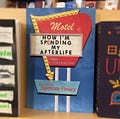


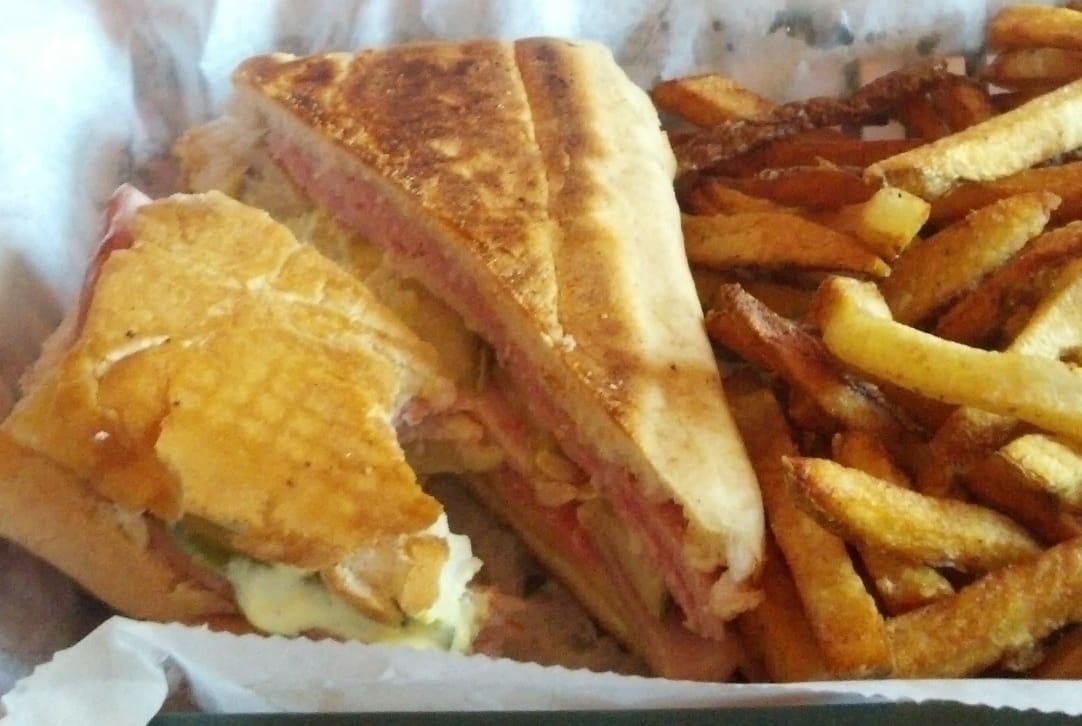

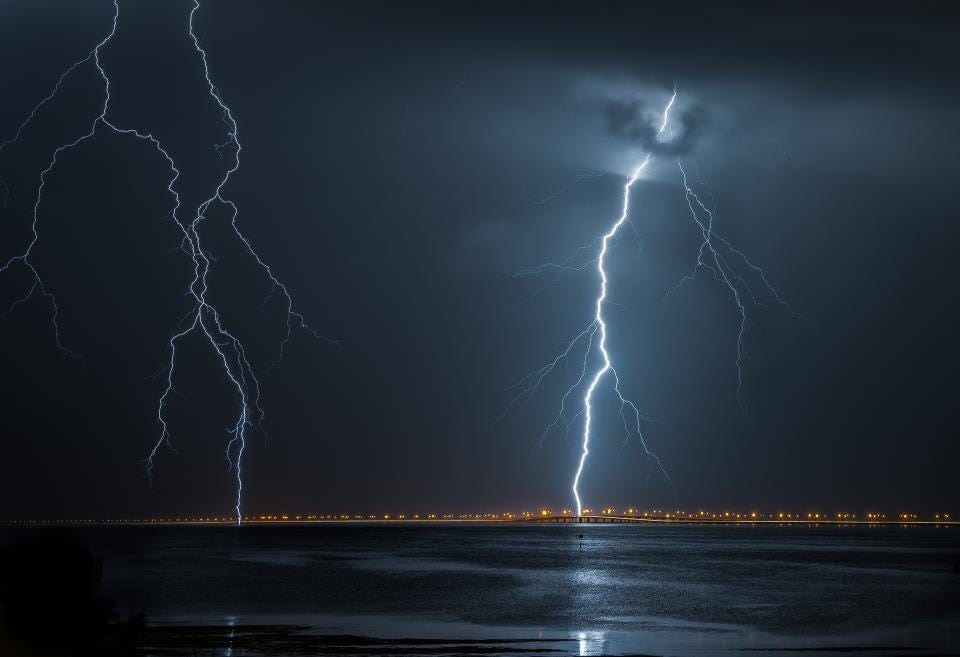
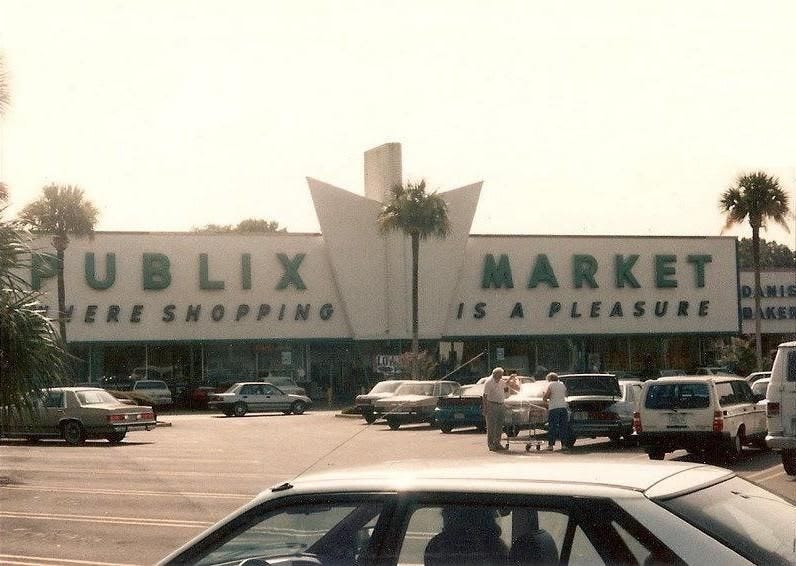
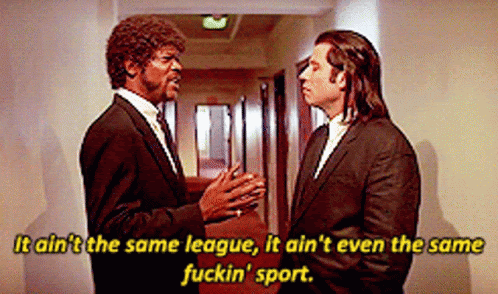
Love this. I write Finding Home on substack and have spent years exploring how we connect to people and places. Everything you write about Florida... that stuff will always stay with you. The way you feel about cubanos is the way I feel about Chicago pizza (cut in squares unless it's stuffed). And thunderstorms - yes! I lived in SF in the '80s and again in the '90s. I still love the city and... I miss what once was.
Definitely subscribing. Also, I appreciate your interview with Hurley Winkler. Congratulations on the re-release of your book! Sounds like something my brother in law would love, so guess what he's getting for Christmas? :)